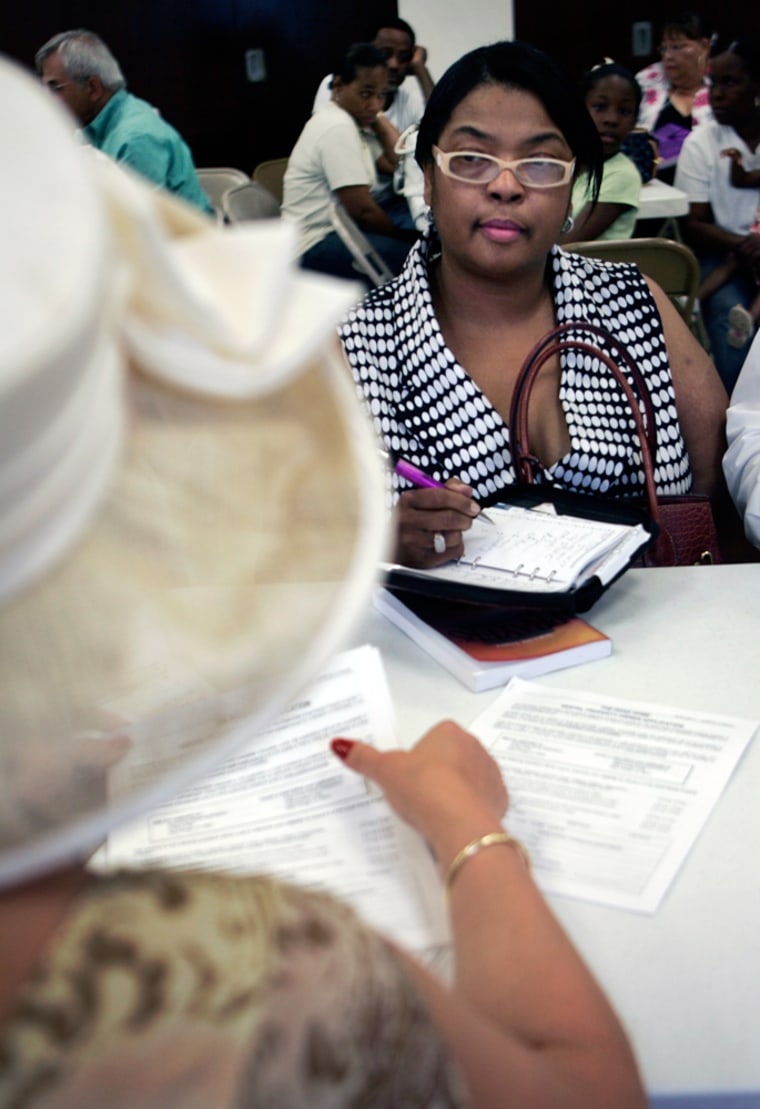Homeowners whose properties were ravaged by Hurricane Katrina hustled to meet a deadline to apply for rebuilding grants, but many had little faith the federally funded program would come through.
The state-administered Road Home program, which offers grants of up to $150,000, is funded with $6.4 billion. But if everyone eligible for the program applied, it would face an estimated $5 billion shortfall.
“If the government doesn’t give me any assistance, then I guess I’m going to have to go overextend myself and take out a loan,” 59-year-old Bessie Griffin said Friday as she waited to meet with Road Home representatives.
Going broke?
Griffin beat Tuesday’s application deadline, but worried the program would go broke before she and thousands of others received any money.
Griffin had vowed to be the first on her block to rebuild when she returned to New Orleans after the Aug. 29, 2005, storm. Her enthusiasm gave way to crippling despair, however, after she gave $10,000 to an unscrupulous contractor who left town without working on her home.
As Tuesday’s deadline approached, several dozen property owners gathered at First Pilgrim Baptist Church in New Orleans to fill out applications or press officials for answers about pending applications.
Joe Cox, 41, and his wife, Tara Cox, 37, applied for a Road Home grant several months ago and are still waiting to hear if they are eligible.
“We’re not holding out much hope,” Tara Cox said.
Didn't stop some
That didn’t stop the couple from slowly rebuilding on their own, without Road Home’s assistance.
“It’s a matter of adjusting expectations,” Joe Cox said. “We didn’t expect anything from it.”
One day in July, Road Home applications peaked at 1,600 applications. Whether any money will be left for last-minute applicants remains to be seen.
State officials set an application deadline for what once was an open-ended program because they want to know how many people are eligible. They can then seek money from Congress to fill the gap.
They’re also working on a plan to reshuffle federal recovery aid and use state surplus dollars to raise $1 billion. The plan needs approval from state lawmakers and federal officials.
Andy Kopplin, executive director of Gov. Kathleen Blanco’s Louisiana Recovery Authority, said the program is awarding about 10,000 grants a month — which comes to about $750 million.
Even with the $1 billion boost, the authority estimates the program will run out of money by mid-December without additional cash. It estimates 49,000 eligible homeowners won’t receive grants if Congress doesn’t provide extra funding.
$2.5 billion to homeowners
More than $2.5 billion in grants have been handed out to more than 38,800 homeowners. Another $5.1 billion in benefits have been calculated for 72,500 additional applicants, exceeding the dollars on hand even with the $1 billion bailout.
Now that the state has committed some of its own money to a Road Home bailout, officials hope to get more for the program in an Iraq war spending bill expected to come before Congress in September or October.
While congressional leaders have expressed support for a Road Home bailout, the White House has been less committal. Donald Powell, President Bush’s Gulf Coast recovery chief, hasn’t indicated whether the White House would back more aid.
Powell and Louisiana officials offer conflicting explanations for the Road Home shortfall. Blanco and authority officials blame inaccurate damage estimates by the federal government. Powell has said the state included more people in the program than federal officials agreed to fund.
The officials are discussing the shortfall, but Powell is seeking more information before he takes a position.
“We look forward to further conversations and a discussion of the facts and analysis,” said Evan McLaughlin, a spokesman with the federal Office of Gulf Coast Rebuilding.
State officials say it will take weeks to sift through the applications and determine how many are eligible — and how much the program will cost.
